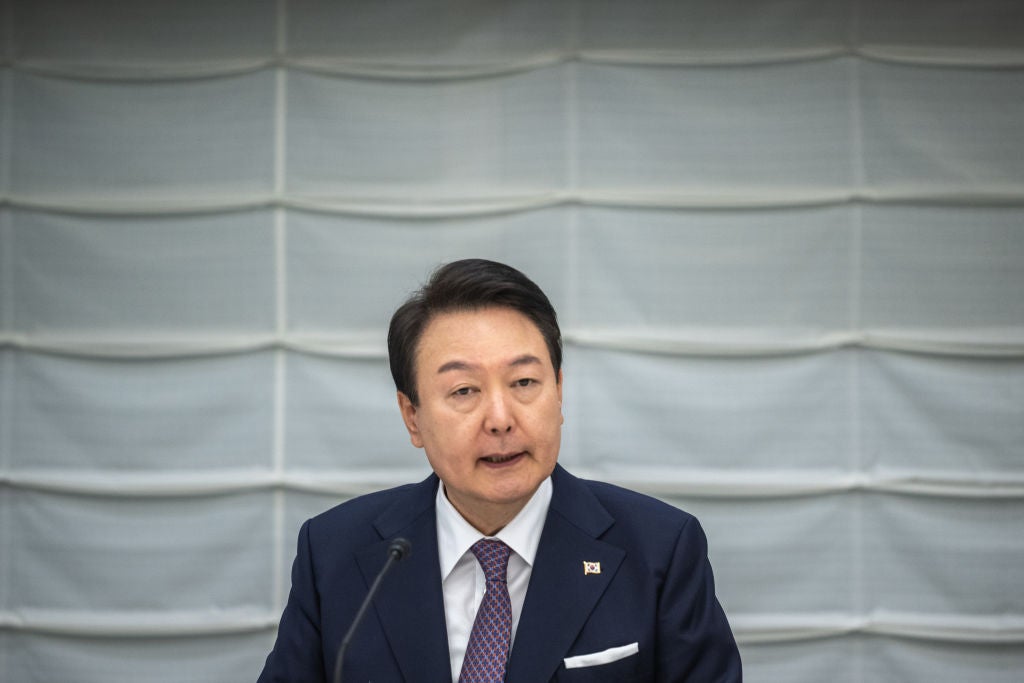
In an interview with Reuters, reported 19 April, South Korean President Yoon Suk Yeol signalled that his government may change its position on arming Ukraine in response to the Russian invasion, saying that it would be difficult for South Korea to insist on only offering financial and humanitarian support in the face of large-scale attacks on civilians that are perpetrated by Russia.
This is the first time that South Korea has indicated it would consider providing lethal aid.
How well do you really know your competitors?
Access the most comprehensive Company Profiles on the market, powered by GlobalData. Save hours of research. Gain competitive edge.

Thank you!
Your download email will arrive shortly
Not ready to buy yet? Download a free sample
We are confident about the unique quality of our Company Profiles. However, we want you to make the most beneficial decision for your business, so we offer a free sample that you can download by submitting the below form
By GlobalDataOn the question over direct support for Ukraine from South Korea, attention must be made over comments from president Yoon on 11 January, suggesting that South Korea could potentially develop its own nuclear weapons in the future. Yoon later walked the statement back, but the extended nuclear deterrence that the US offers is clearly being challenged by North Korea as it builds out its intercontinental ballistic missile capability.
Against this backdrop, consideration about arms to Ukraine become an auxiliary to the bargaining going on within the US-South Korean alliance.
“Obviously they’re under some pressure from the United States,” said Euan Graham, senior fellow of the International Institute of Strategic Studies.
China’s involvement in the geopolitical landscape of Northeast Asia cannot be overlooked. South Korea is currently seeking to establish a diplomatic equilibrium while refraining from aligning with an anti-China coalition. The caution that distinguishes South Korea from Japan is significant.
“[South Korea] is much more focused on North Korea. It doesn’t want to signal a policy of being in coalition or in inchoate coalition against China. So, this may be its way of buying goodwill from the US in other ways. I’m speculating there,” says Graham, “but I think that’s probably part of the alliance bargaining that’s going on.”
Russia’s response to Yoon’s comments came later the same day. Kremlin spokesperson Dmitry Peskov acknowledged the interview with remarks indicating that supply of arms to Ukraine would be taken by Russia as South Korea involving itself in the conflict. “Unfortunately, Seoul has taken a rather unfriendly stance,” adding that “The start of arms supplies will indirectly mean a certain stage of involvement in this conflict.”
Russia’s former president Dmitry Medvedev added to this, indicating that such a move by South Korea could result in a supply of military aid from Russia to North Korea: “I wonder what the residents of this country will say when they see the latest Russian arms with their closest neighbours – our partners from the DPRK… Quid pro quo.”
Graham described Russia’s remarks as poorly handled: “That was an obvious irritant that’s going to alienate the RoK government when they RoK Government actually has been quite ambivalent about Russia. So, I just thought that was self-defeating.”
“It sounded to me like a vague threat as well. I don’t think that Russia really has the spare gas in the tank to make idle threats of transferring military equipment to other countries at the moment, let alone North Korea.”
While Russia may be warning South Korea against arming Ukraine, in a sense it is too late to prevent it from having an immediate effect on the levels of supply and munitions heading into the conflict. “South Korea has already made its influence felt as a defence-industrial powerhouse through the Poland deal, and in dealing with other Nato countries as a significant supplier, now,” explained Graham.
South Korea has supplied land platforms, aircraft, and munitions to Poland on an unprecedented scale, backfilling inventory that the Nato partner is supplying to its neighbour, Ukraine. South Korea has exported $12.4bn in arms to Poland since the full-scale invasion began, originally with the caveat that these supplies would not find their way to Ukraine.
South Korean support to Ukraine has also been mediated through US stockpiles. “The US has already been trying to indirectly draw on that by getting the Koreans apparently to backfill some of the stock of the US forces in Korea, which enables the Americans to transfer some of that to Ukraine,” said Graham, adding, “In global terms, it’s an important addition to allied capacity.”
“It also fits the Korean drive to make the defence industry a core export sector for them.”
“What’s not clear is, of course, who would ultimately be paying for this?” asks Graham. “I don’t think the Koreans would be transferring it for free. It would either be a quid pro quo with the US, or else the US would be underwriting it.”




